
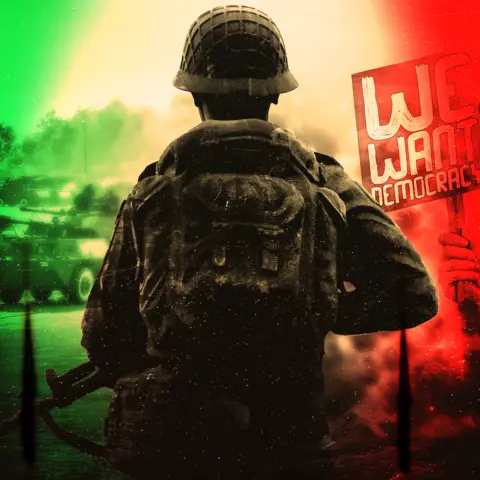 BBC
BBCMyanmar's once formidable military is beginning to crack from within, becoming filled with spies secretly working for pro-democracy rebels, the BBC has found.
An investigation by the BBC World Service revealed that the military only fully controls less than a quarter of Myanmar's territory.
The junta still controls major cities and remains “extremely dangerous,” according to the UN special rapporteur on Myanmar. But it has lost a large amount of territory in the past 12 months.
Soldier spies are known as “watermelons” – green on the outside, rebellious red on the inside. Ostensibly loyal to the military but secretly working for pro-democracy rebels whose symbolic color is red.
A major stationed in central Myanmar says it was the army's brutality that prompted him to change his stance.
“I saw the bodies of tortured civilians,” Kyaw (not his real name) says. “I shed tears.” “How can they be so cruel against our people? We are supposed to protect civilians, but now we are killing people. It is no longer an army, but a terrorizing force.”
The United Nations says more than 20,000 people have been arrested and thousands killed since the military seized power in a coup in February 2021, sparking an uprising.
Kyaw initially considered defecting from the army, but he and his wife decided that working as a spy was “the best way to serve the revolution.”
When he deems it safe to do so, he leaks internal military information to the People's Defense Forces (PDF) – a network of civilian militia groups. The insurgents use the intelligence to ambush the army or avoid attacks. Kyaw also sends them some of his salary so they can buy weapons.
Spies like him help the resistance achieve the previously unthinkable.
The BBC assessed the balance of power in more than 14,000 village communities as of mid-November this year, and found that the military only fully controlled 21% of Myanmar's territory, nearly four years after the start of the conflict.
The investigation reveals that ethnic armies and a mixture of resistance groups now control 42% of the country's land area. Much of the remaining area is disputed.
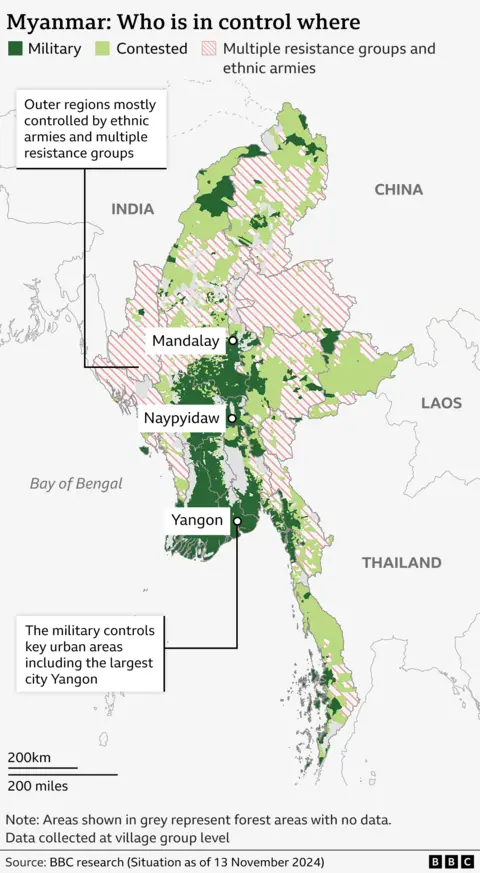
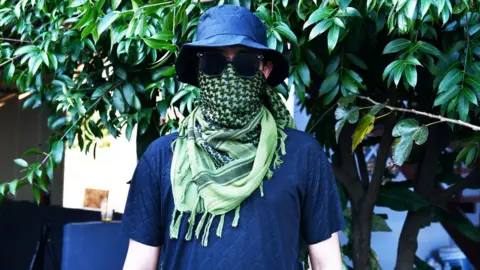 NBC/BBC
NBC/BBCWatermelon information leaked from within the army helps tip the balance. Two years ago, the resistance established a specialized unit to manage the growing network of spies and recruit more.
Agents like Win Aung (not his real name) collect watermelon leaks, verify them where possible, and then pass them on to rebel commanders in the relevant area.
He is a former intelligence officer who defected and joined the resistance after the coup. He says they now get new watermelons every week, and social media is a major recruiting tool.
He says their spies range from low-ranking soldiers to high-ranking officers. They also claim to have a watermelon in the military government – “from ministries to village chiefs.”
They are put through a strict verification process to ensure they are not double agents.
Motives for becoming a spy vary. While in Kyaw's case it was anger, for a man we call Mo – a Marine corporal – it was simply a desire to survive for the sake of his young family.
His wife, who was pregnant at the time, pushed him to do so, convinced that the army was losing and that he would die in battle.
He began leaking information to the Watermelon Unit about weapons and troop movements.
Daiva, the pro-democracy rebel leader, says this kind of intelligence is crucial.
His resistance unit's ultimate goal is to take control of Yangon, Myanmar's largest city and his former home. But they are far from that.
The military holds the majority of major urban areas – home to critical infrastructure and revenues.
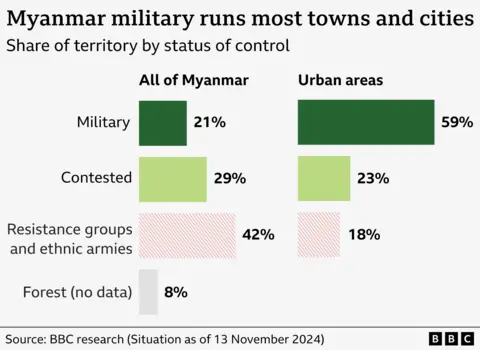
“It is easier said than done to attack and occupy Yangon,” says Daiva. “The enemy will not give it up easily.”
Unable to physically penetrate the city, from his base in the jungle, Daeva directs targeted attacks by underground cells in Yangon using watermelon information.
In August, we witnessed him make one of these calls. We were not given details but were told that the aim was to direct an attempt on the life of a colonel.
He told them: “We will do this within the enemy's security standards.” “Be careful, the enemy is losing in every direction,” he added, telling them that this meant they would likely be on alert to confront hackers and spies.
Daiva says that many of his unit's major attacks were the result of tip-offs.
“We started with nothing, and now look at our success,” says Daeva.
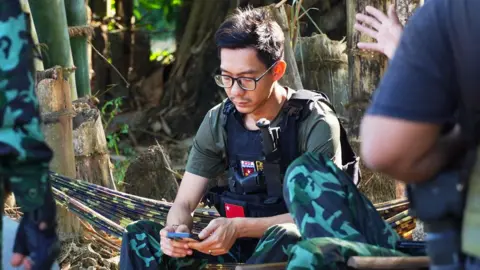 NBC/BBC
NBC/BBCBut that comes at a cost. Watermelon has to live in fear from both sides, as Mo, a Marine corporal turned spy, finds out.
He was deployed from Yangon to Rakhine – a border region where the army is fighting an ethnic group that sided with the resistance – and had to live with the horror that his intelligence might mean he himself was under attack.
In March of this year, his anchored ship was hit by a projectile missile, followed by open gunfire. “There was nowhere to run. We were like rats in a cage.” Seven of his fellow soldiers were killed in the rebel attack.
“Our ability to protect (moles) is very limited,” Win Ong admits. “We cannot openly declare that it is a watermelon. We cannot prevent our forces from attacking any particular military convoy.”
He says that when this is explained to Watermelon, he does not falter. Some even replied: “When it comes to that moment, don't hesitate, shoot.”
But there are times when spies cannot take the risk.
When Mo was scheduled to be sent to another dangerous front line, he asked the Watermelon Unit to smuggle him into a resistance-controlled area. They do this using an underground network of monasteries and safe houses.
He left in the middle of the night. The next morning, when he did not show up for duty, soldiers came to the house. They questioned his wife, Zhou, but she remained silent.
After days of escaping, Mo arrived at one of the Daeva bases. Dayva thanked him via video call, before asking him what role he wanted to play now. Mo responded that due to the young age of his family, he would like to take a non-combat role and would instead share his knowledge of military training.
A few weeks later he crossed the border into Thailand. Cho and the children also fled their home and hope to eventually join him and build a new life there.
The army is vigorously trying to regain lost territory, and is carrying out a wave of deadly bombings. And with Chinese and Russian-made fighter jets, it has the upper hand in the air. It knows that the resistance is far from being one homogeneous group, and seeks to exploit the divisions between them.
“As the junta loses control, their brutality is increasing,” says UN Special Rapporteur Tom Andrews. “And it's getting worse. Loss of life… brutality and torture as they lose ground, literally and figuratively.”
The army is also carrying out combing operations in search of watermelons.
“When I heard about the raids, I stopped for a while,” Kyaw says. He says he always acts like a strong supporter of the military to avoid unwanted attention.
But he is afraid and does not know how long he can stay hidden. Defection is not an option, as he is worried about abandoning his elderly parents, so for now, he will continue working as a military spy, hoping to see a day when the revolution ends.
If that day comes, watermelons like Kyaw and Mo will not be forgotten, Win Aung vows.
“We will treat them with honor, and let them choose what they want to do next with their lives.”
The army did not respond to the BBC's request for an interview.
About data:
Researchers commissioned by the BBC questioned multiple sources from 12 February to 13 November 2024 for each of more than 14,000 village groups to assess the level of military control in their area.
The names and boundaries of village groups were obtained from Myanmar Information Management Unit, or MIMU, Which is hosted by the United Nations Development Program (UNDP).
In each case, the research team spoke to at least one source who had no formal affiliation with the military or the opposition – such as academics, charity workers, journalists and local residents.
When sources provided conflicting information to a village group, non-affiliated sources were prioritized and cross-checked with media reports.
Responses were divided into three possible control categories:
- army: The army is present and active in the region. It runs a local administration or provides some public services, all of which function normally.
- Disputed: The army is present in the region, but there are limits to its effective control. This could include areas where public administration and public services are not fully functioning, or where the military divides administration with regional ethnic armed forces. It also covers areas into which opposition forces can enter and exit, and where skirmishes occur between opposing forces.
- Resistance groups and ethnic armies: The army is largely absent and has not carried out operations on the ground for more than three months. Civilian services may be provided by resistance forces, ethnic armies, or a civilian government, possibly supported by a rebel armed militia.
Some parts of the country are classified as forests and are not assigned village clusters. They have different administrative structures, dealing mainly with resource extraction and conservation. The BBC has chosen to focus on areas of Myanmar that have a clearly defined system of governance.
Additional reporting by Becky Dale, Moskin Lidar, Phil Leak, Callum Thompson, Pilar Thomas, Charlotte Atwood and Kelvin Brown. Methodology was supported by Professor Lee Jones, Queen Mary University of London.








